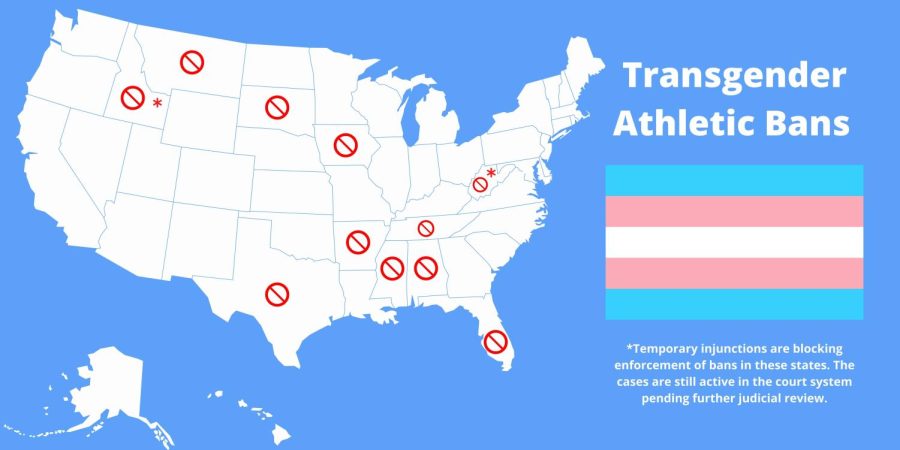Student-athletes react to Kim Reynolds’ latest legislation
Ten other states have transgender sports bans in place including Idaho, Florida, Tennessee and West Virginia.
March 23, 2022
On March 3, 2022, Iowa Governor Kim Reynolds signed legislation immediately prohibiting transgender women and girls from competing in female sports offered by not only middle and high school-sponsored sports but also colleges and universities.
Reynolds signed it one day after it passed in the House and Senate.
“Great things happen when women have access to the fair and equal playing field they deserve,” Reynolds said in a press conference. “But what would it say about a commitment to this principle if we let actual playing fields — the courts, fields, rinks, pools and tracks of youth and collegiate sports — be tilted in favor of biological males with inherent physical advantages?”
The new law requires school-sponsored athletic events to be designated as a men’s, women’s or co-ed sport. The athletes that compete in women’s sports must have female listed as the sex on their birth certificate.
Students have the opportunity to sue if they believe they have suffered “direct or indirect harm” based on any violation in a school. According to HF2416, the state attorney will represent individuals looking to sue as well as incur any legal costs.
Ten other states have transgender sports bans in place including Idaho, Florida, Tennessee and West Virginia, all of which are dealing with ongoing lawsuits regarding alleged Title IX violations.
The new bill has sparked controversy across the United States as well as arguments from both sides.
Those who oppose the bill argue that this bill violates human rights.
“I believe that everyone deserves equal opportunities and chances regardless of how they identify themselves,” Wartburg cheerleader Jenna Bachus said. “Let girls play with girls.”
Others say that Reynolds is attempting to make a political statement in her pursuit of reelection.
“There are much more pressing issues in women and girls athletics, such as disordered eating habits, sexual harassment and assault, wage gaps and general unequal treatment,” Drake rower Beatrice Kearns said. “It is shameful to see that our state is targeting an already vulnerable group of young people. Few of these legislators are involved in women and girls athletics and trans-inclusion has no impact on them.”
Those for the ban said they felt that it is to preserve women’s sports.
“The general sentiment regarding the bill in my opinion is pretty negative because it is easily seen as discriminatory towards trans women, and I completely understand where that argument and that sentiment is coming from,” Simpson soccer player Andrew Russell said. “I don’t personally believe that social policy is an aspect that government should have its hand in, and that feeling extends to this case as well. That being said, when I look at this bill it is easy to see it as discriminatory; however, I always try to look at the true purpose of the bill. I believe that the true purpose was not to discriminate but, instead, to protect the rights of cisgender women in athletics.”
Another reason some support the ban is because of the biology of women and transgender women compared.
“I am for the ban because I support and believe in women’s sports. Transgender women have physical attributes that biological women do not,” Central College wrestler Ryne Mohrfeld said. “They have larger frames, muscular mass and other athletic advantages. Examples of transgender women competing and dominating MMA, track and field and powerlifting serve as examples of how transgender women hold an unfair athletic advantage over biological women.”
Studies examining the effects of testosterone suppression on muscle mass and strength in transgender women show the loss of lean mass, muscle area and strength typically amounts to approximately 5% after 12 months of treatment.
Lastly, some view this issue from both sides.
“I am all for transgender athletes wanting to participate in sports because no one ever said that sports were only meant for men or women,” Simpson baseball player Matthew Marquez said. “Contact sports are difficult for the inclusion of transgender athletes because if you put it black and white, strength is a big component as to why there are men and women’s sports. But when it comes to non-contact sports like baseball, golf, track, basketball…etc. I am all for transgender athletes competing, because why not?”
Not only are individuals opposing the legislation, so are major companies. Over 170 companies, including The Walt Disney Company, Johnson & Johnson, Amazon, Microsoft and Starbucks to name a few, have signed the Business Statement Opposing Anti-LGBTQ State Legislation from the Human Rights Campaign that states they are “dedicated to equal treatment, respect and opportunity for all.”
Most recently in the world of college athletics, University of Pennsylvania athlete Lia Thomas become the first transgender NCAA champion in Division I history after winning the women’s 500-yard freestyle swimming championship. Thomas competed for the men’s team prior to this season and has faced major backlash, including from 16 unnamed members of the Penn women’s swimming team. According to the NCAA policy, a female transgender athlete must undergo testosterone suppression therapy for at least one year. Thomas has been undergoing therapy for at least two, making her fully eligible to compete.
















